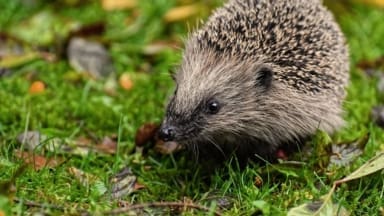
Traditionally, hedgehog numbers have been monitored by counting hedgehog road casualties and using these as an indication of changes in the wider population. Though, these surveys provide a snapshot of information on hedgehog location, they don’t monitor how that population is faring – until it’s too late. Moreover, there is little evidence to explain the reasoning behind their decline.
Hedgehogs in Britain have undergone a long historic decline. The State of Britain Hedgehogs report estimates that hedgehog numbers have decreased by up to 75% in rural areas since the turn of the century. Urban hedgehog populations do appear to be stabilising and showing signs of recovery but rural numbers are acutely low. Treasured in their own right, hedgehogs are also an indicator species indicating the health of the natural world.
According to Danielle Greaves, Higher Officer for Natural England, the National Hedgehog Monitoring Programme is trialling a pioneering combination of trail cameras and artificial intelligence (AI) which with help from volunteers aims to establish robust hedgehog population estimates. Images captured will be sorted using AI algorithms for volunteers to review and classify on species shown. Once classified, the images are analysed to reveal population numbers. They will also be able to uncover information on population density, different habitats, and changes to populations over time – vital in producing insights into the factors causing the decline of the much loved hedgehog and enable conservationists to implement long-term, practical conservation measures to address this challenge.
The Monitoring Programme, coordinated by the People’s Trust for Endangered Species and The British Hedgehog Preservation Society, is currently being piloted in multiple locations across the country, with an initial target number of forty survey sites. For added vital expertise, partnerships with groups have been formed, including Nottingham Trent University (NTU), Zoological Society of London, London Hogwatch, MammalWeb and Durham University, with co-funding provided by Natural England. According to Greaves, success of the project will be down to the volunteers. Anyone keen to be involved are asked to visit the National Hedgehog Monitoring Programme website for more information and access to the training and ID guides.

